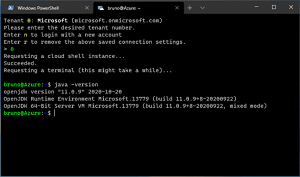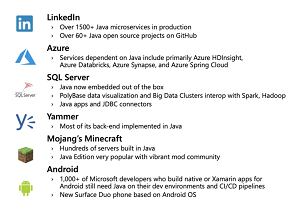News
Microsoft Previews Its Own Build of OpenJDK
"We use more Java than one can imagine," Microsoft says. Along with using it, the company is contributing to it, most recently by previewing the Microsoft Build of OpenJDK, described as "a new no-cost long-term supported distribution and Microsoft's new way to collaborate and contribute to the Java ecosystem."
Microsoft jumped on the Java bandwagon in a big way in 2019 by forming the Java Engineering Group in its Developer Division and acquiring jClarity to optimize Java workloads in its Azure cloud platform (despite the similarities between Java and Microsoft's own C#). Last year, it ported OpenJDK for Windows 10 on Arm (AArch64)-based devices.
But the new Microsoft Build of OpenJDK is a much bigger step. Announced as a preview -- not ready for production use -- it provides Java 11 binaries (based on OpenJDK 11.0.10+9) for x64 server/desktop implementations on macOS, Linux and Windows.
Java 11, however, was released about 2-1/2 years ago, and the company also is publishing a new Early Access binary for the recent Java 16 for Windows on ARM, with OpenJDK 17 binaries on tap for this year after Java 17 is finalized. The build based on 2018 tech is a preview because Microsoft wants to solicit feedback from developers to round it into GA shape.
For now, the preview already conforms to Java 11 specs and can replace any other OpenJDK distro out there. What makes the Microsoft Build of OpenJDK 11 binaries different from those, the company says, is "backported fixes and enhancements we deem important to our customers and our internal users."
 [Click on image for larger, animated GIF view.] Microsoft Build of OpenJDK on Azure Cloud Shell in Animated Action (source: Microsoft).
[Click on image for larger, animated GIF view.] Microsoft Build of OpenJDK on Azure Cloud Shell in Animated Action (source: Microsoft).
The company is also eating its own dog food, noting that its extensive internal usage of the language includes running more than 500,000 Java Virtual Machines (JVMs), of which more than 140,000 are already based on the Microsoft Build of OpenJDK. So it's apparently production-ready enough for the Redmond, Wash., software giant.
 [Click on image for larger view.] Java at Microsoft (source: Microsoft).
[Click on image for larger view.] Java at Microsoft (source: Microsoft).
Azure is still a primary target of internal Java development -- powering critical tasks and supporting global infrastructure -- but those JVMs are also used for back-end microservices, Big Data systems, message brokers, event streaming services and gaming servers. For examples, Java powers back-end services for both its LinkedIn and Yammer properties, which are mostly implemented on distributed cloud-native Java microservices.
"Java is one of the most important programming languages used today -- developers use Java to build everything from critical enterprise applications to hobby robots," the company said in an April 6 announcement. "At Microsoft, we've seen increasing growth in customer use of Java across our cloud services and development tools. We're continually working to broaden and deepen our Java support for customers and developers."
Longtime readers of Visual Studio Magazine may remember the company's own Microsoft Java Virtual Machine (JVM) technology, which it discontinued back in 2009 shortly after Oracle agreed to buy Sun Microsystems. That preceded an incredibly complex and long series of Java-related court battles that still continues to this day between Oracle and Google.
About the Author
David Ramel is an editor and writer at Converge 360.